江苏省扬州中学2015届高三下学期开学检测英语试题及答案
江苏省扬州中学2015届高三第四次模拟考试(5月) 英语

2015届高三第四次模拟考试试卷英语说明: 1. 本试卷分第一卷(选择题)和第二卷(非选择题)两部分。
满分120分,考试时间120分钟。
2.在答题纸的密封线内填写学校、班级、姓名、考号等,密封线内不要答题。
3.请将所有答案均按照题号填涂或填写在答题卡/纸相应的答题处,否则不得分。
I 卷(选择题,共85分)第一部分:听力(共两节,满分20分)第一节:(共5小题;每小题1分,满分5分)听下面5段对话。
每段对话后有一个小题,从题中所给的A、B、C三个选项中选出最佳选项,并标在试卷的相应位置。
听完每段对话后,你都有10秒钟的时间来回答有关小题和阅读下一小题。
每段对话仅读一遍。
1.What would the man like to drink?A.Iced coffee. B.Regular tea. C.Hot coffee.2.Who will the woman go to the baseball game with?A.Her father. B.The man. C.Her mother.3.What do we know about the man?A.He’s a college student.B.He won’t live at home next year.C.He bought too many clothes.4.What does the woman mean?A.The man can get his hair cut anywhere.B.The man should go to a different neighborhood.C.The man doesn’t need a haircut.5.Why did the woman ask the man for the time?A.Her watch just broke.B.She has a dinner appointment.C.She has to meet someone to go running.第二节:(共15小题;每小题1分,满分15分)听下面5段对话或独白。
江苏扬州中学2015届高三上学期质量检测(英语卷解析)

江苏省扬州中学2014—2015学年第一学期质量检测高三英语试卷2014.12【试卷综评】本试卷围绕时代内容设计基础能力题,旨在考查教师平时学生的基础知识掌握情况,比如单项选择的设计。
完形填空和阅读理解选材具有时代性,紧密联系生活实际,选项设计灵活合理,注重考查学生的阅读理解能力。
任务型阅读重点考查学生的阅读和表达能力,书面表达联系实际以把“人与人应和谐相处”为题,考查学生的英语实际运用能力。
总之,本次试卷难度适中,是一份质量较高的试卷。
本卷分为第Ⅰ卷(选择题)和第Ⅱ卷(非选择题),满分120分。
考试时间120分钟。
第I 卷(选择题,三部分,共75分)第一部分听力(共两节,每题1分,满分20分)第一节(共5小题;每小题1分,满分5分)听下面5段对话。
每段对话后有一个小题,从题中所给的A、B、C三个选项中选出最佳选项,并标在试卷的相应位置。
听完每段对话后,你都有10秒钟的时间来回答有关小题和阅读下一小题。
每段对话仅读一遍。
1. What does the man want?A. A tennis game.B. An online game.C. A shooting game.2. What will the man do next?A. Make dinner.B. Wash the dishes.C. Watch TV.3. What does the man mean?A. He prefers to keep the window closed.B. He is too busy to open the window.C. He agrees to open the window at once.4. What is the time now?A. About 5:30.B. About 5:00.C. About 4:30.5. What does the man suggest doing?A. Pressing the emergency button.B. Calling the service centre.C. Doing nothing for a short while.第二节(共15小题;每小题1分,满分15分)听下面5段对话。
扬州中学高三下学期开学检测英语试题及答案
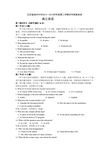
江苏省扬州中学2012—2013学年度第二学期开学质量检测高三英语第一部分听力(共两节,满分20分)第一节(共5小题)听下面5段对话。
每段对话后有一个小题,从题中所给的A、B、C三个选项中选出最佳选项,并标在试卷的相应位置。
听完每段对话后,你都有10秒钟的时间来回答有关小题和阅读下一小题。
每段对话仅读一遍。
1. What might prevent the woman buying the table?A. Its quality.B. Its price.C. Its design.2. Who planted the trees?A. The woman.B. Henry.C. Someone else.3. What happened to the woman?A. She got fired today.B. She got promoted last week.C. She was fooled by the man.4. What did the man do?A. He gave the woman the wrong information.B. He put the sugar in the black container.C. He added salt to his coffee.5. How long is a day on Mars?A. Less than 24 hours.B. 24 hours and 37 minutes.C. 37 hours.第二节(共15小题)听下面5段对话或独白。
每段对话或独白后有几个小题,从题中所给的A、B、C三个选项中选出最佳选项,并标在试卷的相应位置。
听每段对话或独白前,你将有时间阅读各个小题,每小题5秒钟;听完后,各个小题将给出5秒钟的作答时间。
每段对话或独白读两遍。
听第6段材料,回答第6至8题。
6. What do we know about the woman’s document?A. It’s about 30000 words long.B. It’s written in English.C. It’s a textbook.7. Which language is the most difficult according to the man?A. Arabic.B. Spanish.C. English.8. What does the woman decide to do?A. Translate the document herself.B. Hire the man to do the translation.C. Look for another translator.听第7段材料,回答第9、10题。
江苏省扬州市2015届高三第一次调研测试英语试题(扫描版)
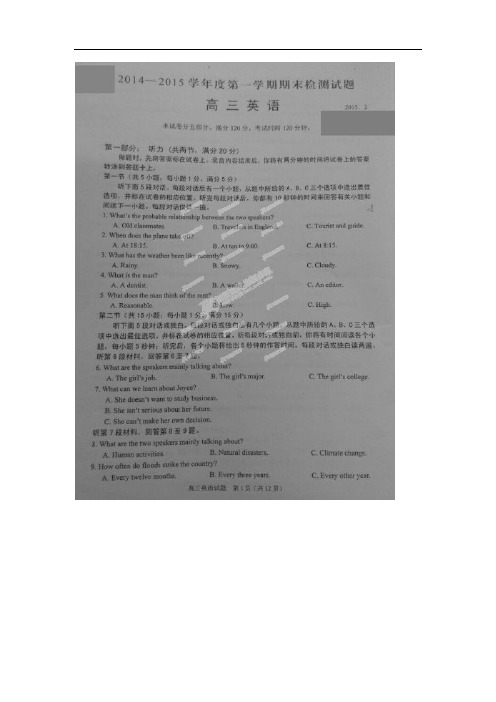
★
信息未能清楚的传递给读者。
第一档(很差):(0-5分)未能完成了试题规定的任务。
★明显遗漏主要内容要点,写了一些无关内容,原因可能是未能理解试题要求。
★语法结构简单、词汇项目有限。
★较多语法结构或词汇方面的错误,影响对写作内容的理解。
★缺乏语句间的连接成分,内容不连贯。
★信息未能传达给读者。
听力材料
M: Joyce?
W: Yeah, Dad! I’m in my room. I’m packing.
M: Hi, honey. I can’t believe you are going to college! So, what do you want to study?
W: Art.
M: Art? e on, Joyce. Be serious. I think you should study business so you can get a good job. You are a very smart, organized young woman. It’s perfect for you.
W: Bu t, Dad…There’s a lot I can do with an art degree. The business world is very petitive.
M: I don’t know, Joyce…。
江苏省扬州中学2015届高三1月质量检测 英语 Word版含答
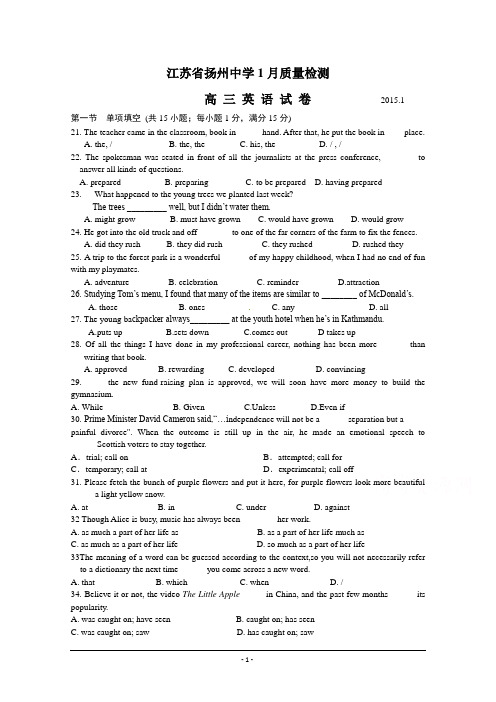
江苏省扬州中学1月质量检测高三英语试卷2015.1第一节单项填空(共15小题;每小题1分,满分15分)21. The teacher came in the classroom, book in _____ hand. After that, he put the book in ____place.A. the, /B. the, theC. his, theD. / , /22. The spokesman was seated in front of all the journalists at the press conference, _______ to answer all kinds of questions.A. preparedB. preparingC. to be preparedD. having prepared23. --- What happened to the young trees we planted last week?---The trees _________ well, but I didn‟t water them.A. might growB. must have grownC. would have grownD. would grow24. He got into the old truck and off _______ to one of the far corners of the farm to fix the fences.A. did they rushB. they did rushC. they rushedD. rushed they25. A trip to the forest park is a wonderful ______of my happy childhood, when I had no end of fun with my playmates.A. adventureB. celebrationC. reminderD.attraction26. Studying Tom‟s menu, I found that many of the items are similar to ________ of McDonald‟s.A. thoseB. onesC. anyD. all27. The young ba ckpacker always_________ at the youth hotel when he‟s in Kathmandu.A.puts upB.sets downes out D takes up28. Of all the things I have done in my professional career, nothing has been more ______ thanwriting that book.A. approvedB. rewardingC. developedD. convincing29. _____the new fund-raising plan is approved, we will soon have more money to build the gymnasium.A.WhileB. GivenC.UnlessD.Even if30.Prime Minister David Cameron said,“…i ndependence will not be a ______separation but a painful divorce". When the outcome is still up in the air, he made an emotional speech to ______Scottish voters to stay together.A.trial; call on B.attempted; call forC.temporary; call at D.experimental; call off31. Please fetch the bunch of purple flowers and put it here, for purple flowers look more beautiful _____ a light yellow snow.A. atB. inC. underD. against32 Though Alice is busy, music has always been ________her work.A. as much a part of her life asB. as a part of her life much asC. as much as a part of her lifeD. so much as a part of her life33The meaning of a word can be guessed according to the context,so you will not necessarily refer to a dictionary the next time ______you come across a new word.A. thatB. whichC. whenD. /34. Believe it or not, the video The Little Apple______in China, and the past few months ______its popularity.A. was caught on; have seenB. caught on; has seenC. was caught on; sawD. has caught on; saw35.— Sir, you are fined for speeding. Please sign here.— Fined? Speeding? ______.A. Are you all right?B. You can't be serious!C. I'm a foreigner.D. It doesn't matter.第二节:完形填空(共20小题;每小题1分,共20分)There are two leading, complementary views on the sources of workplace stress. Understanding the difference between the two is the first step in learning how to cope with.The first regards stress as coming from how you 36 your situation. For example, one day your boss emerges from a long, closed-door meeting 37 upset. Then she e-mails you requesting a meeting. Do you 38 think you‟d be fired? If your mind starts spinning a disaster, it‟s enough to drive your body to a stress 39 . To cope with it, you may not be able to avoid the stir, 40 you can learn to change your response and 41 your mind. Start keeping a list of everything in your day that causes stress. Is there something new or 42 in your work life? Do certain colleagues make your 43 boil? Find how every item 44 the list makes you feel and then ask yourself, “Is my reaction correct?” This step is the 45 to finding a 46 way to deal with them, once you understand where your emotions are coming from.The other view says outside factors, 47 distressing work environments, mostly drive workplace stress. Common 48 of stress-causing environments include non-communicative bosses, 49 isolating work, and jobs that require much effort but offer little 50 . Finding another job may be the most effective solution in the long run. But until the job market 51 , find ways to regain a sense of control 52 your 53 . If you must endure a two-hour trip in rush-hour traffic to arrive at the office by 9 am, start your workday earlier, so you 54 the worst time to travel. If you can‟t 55 your colleagues, shut your office door or take your work to a conference room for part of the day.36. A. believe B. perceive C. receive D. relieve37. A. feeling B. keeping C. looking D. turning38. A. constantly B. currently C. immediately D. occasionally39. A. situation B. reaction C. condition D. association40. A. and B. even if C. but D. if41. A. calm B. change C. set D. speak42. A. creative B. different C. familiar D. successful43. A. blood B. body C. head D. heat44. A. among B. within C. on D. to45. A. way B. key C. method D. technique46. A. healthier B. newer C. readier D. stronger47. A. as B. despite C. except D. like48. A. appearances B. atmospheres C. categories D. characteristics49. A. socially B. publicly C. organizationally D. personally50. A. wealth B. profit C. award D. reward51. A. puts up B. calls up C. picks up D. gets up52. A. over B. on C. in D. at53. A. positions B. properties C. spaces D. surroundings54. A. avoid B. miss C. prevent D. resist55. A. accept B. convince C. please D. stand第三部分阅读理解(共15小题;每小题2分,满分30分)AIt was 3: 45 in the morning when the vote was finally taken. After six months of arguing and final 16 hours of hot parliamentary debates, Australia's Northern Territory became the first legal authority in the world to allow doctors to take the lives of incurably ill patients who wish to die. The measure passed by the convincing vote of 15 to 10. Almost immediately word flashed on the Internet and was picked up, half a world away, by John Hofsess, executive director of the Right to Die Society of Canada. He sent it on via the group's on-line service, Death NET. Says Hofsess: We posted bulletins all day long, because of course this isn't just something that happened in Australia. It's world history.The full import may take a while to sink in. The NT Rights of the Terminally Ill law has left physicians and citizens alike trying to deal with its moral and practical implications. Some have breathed sighs of relief, others, including churches, right-to-life groups and the Australian Medical Association, bitterly attacked the bill and the haste of its passage. But the tide is unlikely to turn back. In Australia-where an aging population, life-extending technology and changing community attitudes have all played their part-other states are going to consider making a similar law to deal with euthanasia(安乐死). In the US and Canada, where the right-to-die movement is gathering strength, observers are waiting for the dominoes to start falling.Under the new Northern Territory law, an adult patient can request death-probably by a deadly injection or pill-to put an end to suffering. The patient must be diagnosed as terminally ill by two doctors. After a cooling off period of seven days, the patient can sign a certificate of request. After 48 hours the wish for death can be met. For Lloyd Nickson, a 54-year-old Darwin resident suffering from lung cancer, the NT Rights of Terminally Ill law means he can get on with living without the haunting fear of his suffering: a terrifying death from his breathing condition. I'm not afraid of dying from a spiritual point of view, but what I was afraid of was how I'd go, because I've watched people die in the hospital fighting for oxygen and clawing at their masks, he says.56. From the second paragraph we learn that ________.A. the objection to euthanasia is slow to come in other countriesB. physicians and citizens share the same view on euthanasiaC. changing technology is chiefly responsible for the hasty passage of the lawD. it takes time to realize the significance of the law's passage57. When the author says that observers are waiting for the dominoes to start falling, he means________.A. observers are taking a wait-and-see attitude towards the future of euthanasiaB. similar bills are likely to be passed in the US, Canada and other countriesC. observers are waiting to see the result of the game of dominoesD.the effect-taking process of the passed bill may finally come to a stop58. When Lloyd Nickson dies, he will ________.A. face his death with calm characteristic of euthanasiaB. experience the suffering of a lung cancer patientC. have an intense fear of terrible sufferingD. undergo a cooling off period of seven days59. The author's attitude towards euthanasia seems to be that of ________.A. oppositionB. suspicionC. approvalD. indifferenceB“Kill the fool!” “Murder the referee!”These are common remarks one may hear at various sporting events. At the time they are made,they may seem innocent enoug h. But let‟s not kid ourselves. They have been known to influence behavior in such a way as to lead to real bloodshed. V olumes have been written about the way words affect us. It has been shown that words having certain connotations may cause us to react in ways quite foreign to what we consider to be our usual humanistic behavior. I see the term “opponent” as one of those words. Perhaps the time has come to delete it from sports terms.The dictionary meaning of the term “opponent” is “adversary” “enemy”; “one who opposes your interests.” Thus, when a player meets an opponent, he or she may tend to treat that opponent as an enemy. At such times, winning may dominate one‟s intellect, and every action, no matter how gross, may be considered justifiable. I recall an incident in a handball game when a referee refused a player‟s request for a time out for a glove change because he did not consider them wet enough. The player proceeded to rub his gloves across his wet T-shirt and then exclaimed. “Are they wete nough now?”In the heat of battle, players have been observed to throw themselves across the court without considering the consequences that such a move might have on anyone in their way. I have also witnessed a player reacting to his opponent‟s interna tional and illegal blocking by deliberately hitting him with the ball as hard as he could during the course of play. Off the court, they are good friends. Does that make any sense? It certainly gives proof of a court attitude which departs from normal behavior.Therefore, I believe it is time we elevated the game to the level where it belongs there by setting an example to the rest of the sporting world. Replacing the term “opponent” with “associate” could be an ideal way to start.The dictionary mean ing of the term “associate” is “colleague”; “friend”; “companion.” Reflect a moment! You may soon see and possibly feel the difference in your reaction to the term “associate” rather than “opponent.”60. Which of the following statements best expresses th e author‟s view?A. Aggressive behavior in sports can have serious consequences.B. The words people use can influence their behavior.C. Unpleasant words in sports are often used by foreign athletes.D. Unfair judgments by referees will lead to violence on the sports field.61. Harsh words are spoken during games because the players ________.A. are too eager to winB. are usually short-tempered and easily offendedC. cannot afford to be polite in fierce competitionD. treat their rivals as enemies62. What did the handball player do when he was not allowed a time out to change his gloves?A. He refused to continue the game.B. He angrily hit the referee with a ball.C. He claimed that the referee was unfair.D. He wet his gloves by rubbing them across his T-shirt.63. The author hopes to have the current situation in sports improved by ________.A. appealing to players to use clean language on the courtB. raising the referee‟s sense of responsibilityC. changing the attitude of players on the sports fieldD. regulating the relationship between players and refereesCThe man with the bullhorn encouraged the runners as they made their way up the hill. “Two hours, fifteen minutes, forty seconds ...”His dee p, loud voice boomed toward us.It was mile 17 of the marathon.“Hey, great stride!” a bearded viewer yelled to me. He clapped loudly. “You‟re looking strong. Keep going—go, go, go!”You bet I‟m looking strong, I thought, as I followed my younge r sister, Laura. I just got started. She had been diligently clocking eight-minute miles since the race had begun downtown. Initially in the middle of a pack, which was several thousand people, she had been steadily passing other runners for the past 10 miles or so. We were now on the relatively steep rise to the St. Cecelia Bridge. Once we crossed, we would begin heading back into town, running along the east side of the Rincon River. Laura had asked me to run the most difficult section of the marathon with her. Not having trained for anything more challenging than a quick walk, and with no experience running in organized events, I figured I might be good for two or three miles.Up ahead, steel drums were playing. A group of drummers was beating their drums, chanting, and encouraging us with their music and smiles. Crossing the bridge, I recalled the advice in the Marathon Handbook. During my preview of the route, it had seemed like a babyish thing to do. But now it seemed like a fine idea, and I spat magnificently over the side of the bridge.“I read the handbook, too!” said a woman behind me, who also let loose over the side of the bridge. We had now started a chain reaction of bridge spitters. It was quite a sight, but I had other things to occupy my at tention, namely the back of Laura‟s sweater.Easing off the bridge, and heading south on Avila Boulevard, Laura and I found our pace together again. Here we could hang to the left of the group and enjoy some brief conversation. “You keeping up okay?” sh e asked. Being her older brother, and therefore unable to admit weakness, I nodded convincingly.“Hey, Lee!” yelled a waving man on the sidewalk. Immediately pleased that my marathon efforts had been recognized by someone I knew, I waved back and reflected on the importance of wearing tie-dyed clothing to a road race of this size. It made it a lot easier to be spotted!The town marathon is a “people‟s” marathon in that it tends to be a family affair, with the runners and spectators creating a festival atmosphere. I managed to run six miles before bowing out, and Laura finished the entire race in under four hours. I now pride myself on telling people that I ran in a marathon. The distinction between having run a marathon and having run in a marathon seems unimportant. If pressed, however, I‟ll admit that I only ran one-fourth of one.Inspired by this year‟s experience, I plan to walk the course—really fast—next year. It‟s not because I‟m jealous of my sister‟s accomplishment. This is not some silly compe tition in which I must do whatever she does. Rather, Laura got free cookies at the finish line, and the promise of that will lead me to any goal.64. Why did the author write this story?A. to explain how marathons are wonB. to tell about the history of marathonsC. to tell a story about a marathon experienceD. to show how difficult running in a marathon can be65. Why was Lee glad he wore a tie-dyed shirt?A. It helped people locate him easily.B. The shirt brought him good luck.C. It added to the festival atmosphere.D. The shirt was a favorite of Laura‟s.66. Which of the following words best describes Laura as she is presented in this passage?A. competitiveB. foolishC. comicalD. carefree67. The tone of this passage is best described as _______.A. tense and anxiousB. light and friendlyC. matter-of-factD. uninterested and boredDI was puzzled! Why was this old woman making such a complaint about our way to deal with an old bush which was of no use to anybody? She had written letters to the local paper, even to a national to protest about our projected by-pass to her village, and, looking at a map, the route was nowhere near where she lived and it wasn‟t as if the area was attractive. I was more than puzzled, I was intrigued. I wanted to know what it was that motivated her. So it was that I found myself knocking on a cottage door, being received by Mary Smith and then being taken for a walk to the woods.“I‟ve always loved this place”, she said, “it has a lot of memor ies for me, and for others. We all used it. They called it …Lovers lane‟. It‟s not much of a lane, and it doesn‟t go anywhere important, but that‟s why we all came here. To be away from people, to be by ourselves.” She added.It was indeed pleasant that day and the songs of many birds could be heard. Squirrels gazed from the branches, quite bold in their movements, obviously few people passed this way and they had nothing to fear. I could imagine the noise of vehicles passing through these peaceful woods when the by-pass was built, so I felt that she probably had something there but as I hold strong opinions about the needs of the community over-riding the opinions of private individuals, I said nothing. The village was quite a distant and dangerous place because of the traffic especially for old people and children, their safety was mor e important to me than an old woman‟s whims (怪念头).“Take this tree”, she said pausing after a short while. “To you it is just that, a tree. Not unlike many others here”. She gently touched the bark. “Look here, under this branch, what can you see?”“It looks as if someone has done a bit of carving with a knife” I said after a cursory (草率的) inspection.“Yes, that‟s what it is!” she said softly. “There are letters and a lover‟s heart”.I looked again, this time more carefully. The heart was still there and there was an arrow through it. The letters on one side were indistinct, but on the other an …R‟ was clearly visible with what looked like an …I‟ after it. “Some budding romance?” I asked, “Did you know who they were?”“Oh yes, I knew them”, said Mary Smith, “it says RH loves MS”.After a pause, she went on … “He had a penknife and I helped him to carve my initials. We were very much in love, but he was going away, and could not tell me what he was involved in the army. I had guessed of course. It was the last evening we ever spent together, because he went away the next day, back to his Unit.”Mary Smith was quiet for a while, then she sobbed, “His mother showed me the telegram. …Sergeant R Holmes ... Killed in action in the invasion of France.‟”I realized that I could be getting out of my depth, and longed to be in my office, away from here and this old lady, snug, and with a cup of tea in my hand.There was a further pause. Mary Smith gently touched the wounded tree, just as she would have caressed him. “And now they want to take our tree away from me.” Another quiet sob, then she turned to me. “I was young and pretty then, I could have had anybody, I wasn‟t always the old woman you see here now. I could have had everything I wanted in life, a lovely man, health and a future to look forwards to”.She paused again and looked around. The breeze gently moved through the leaves with a sighing sound. “There were others, of course, but not a patch on my Robin!” she said strongly. “And now I have nothing except the memories this tree holds. If only I could get my hands on that awful man who writes in the paper about the value of the road they are going to build where we are standing now, I would tell him. Has he never loved, has he never lived, does he not know anything about memories? We were not the only ones, you know, I still meet some who came here as Robin and I did. Yes, I would tell him!”I turned away, sick at heart.68. Why was the by-pass to Mary Smith‟s village to be built thro ugh these woods?A. The community wanted to explore the beauty of the woods as a way of tourism.B. Many people passed these woods causing heavy traffic jam.C. The traffic was inconvenient making the village a dangerous place to live in.D. The village was quite far away and its economy needed improving.69. The underlined sentence “I felt that she probably had something there” means ________.A. I thought there might be something hidden in the woods by Mary SmithB. I guessed there might be a story related with Mary SmithC. I thought there might be some reason for Mary Smith‟s protestD. I guessed there might be a secret purpose of Mary Smith.70. The main purpose of this passage is to ________.A. draw attention to the damage that wars causeB. persuade people to give up private interestC. arouse the awareness of being environmentally friendlyD. introduce a touching but sad love story第Ⅱ卷(两部分共35分)第四部分任务型阅读(共10小题;每小题1分,满分10分)Observational Learning: To See Is to KnowA group of psychologists, led by Albert Bandura, developed social learning theory, which emphasizes the fact that much learning occurs in a social context. This kind of learning, which results simply from observing and imitating the behavior of others, is called observational learning. Observational learning helps people acquire proper behavior in their families and cultures. By watching others, we learn how to greet people, eat, laugh and tell jokes. Do you still remember your first few days in senior grade one? By watching others, you learned how people talked to each other, what clothes were “fashionable,” and how to interact with instructors.With modeling, you observ e others‟ behavior, and then none, some, or all of the behavior may be learned and repeated, or modified. In one of Bandura‟s classic studies, children were divided into three groups: One group watched an adult beating up a Bobo doll, one group watched an adult ignoring the Bobo doll, and the third didn‟t see an adult at all. After being mildly frustrated by being placed in a room with toys, but not being allowed to play with some of them, all of the children were then placed in another room with a variety of toys, including a Bobo doll. Children in the first group tended to imitate what they had seen, mistreating the doll (and inventing new ways to abuse it).Researchers have discovered that several characteristics of models can make learning through observation more effective. Not surprisingly, the more you pay attention to the model, the more you learn. You are more likely to pay attention if the model is an expert, is good looking, has high status, or is socially powerful. Second, by watching others, we learn about what behavior is appropriate forpeople like ourselves, so models who are seen as similar are more readily imitated. All students need to see successful, capable models who look and sound like them.Then, as teachers, how can you apply observational learning? Here are a few guidelines. Above all, model the behavior and attitudes you desire your students to learn. For example, show enthusiasm for the subject you teach. Be willing to demonstrate both the mental and the physical tasks you expect the students to perform. Second, use peers, especially class leaders, as models. For example, in group work, pair students who do well with those who are having difficulties. Third, you may seek the help of class leaders in modeling behavior. Examples include letting high-status students lead an activity when you need class cooperation or when students are likely to be reluctantA grand memorial service was held Wednesday, October 28, 2009,in central Hubei Province to honor three college students who died from rescuing two children from the Yangtze River on October 24. Thousands of people holding chrysanthemums went to the Jingzhou Memorial House to see off the teenagers, all 19-year old students from the Yangtze University based in Jingzhou City.The trio (三位)were Chen Jishi, He Dongxu and Fang Zhao. More than 10 students from the Yangtze University formed a ladder with one student holding another's arms to rescue the two boys in the river on the afternoon of October 24. One of the student lost his grip (控制)on his classmates and all of them were in danger. Several members of a winter swimming team nearby came to help. Chen Jishi, He Dongxu and Fang Zhao were swept away in the torrent. People touched by their selfless act had donated more than 500,000 yuan ( $73 ,206) to their relatives on Wednesday. Millions of Internet users made online comments on major news portals (入口)to show their grief( 悲伤) .“I am also a college student.I sorrow for you,” said Liu Zhuoya from northwestern Xi'an City. However, some questioned the sacrifice. “Sacrifice three and rescue two, is that worthw hile?" asked "Tiaozhantianya" on the forum of www. 163. com." Rescue can not be blind as they could notswim.”写作内容:1 以约30 个词概括短文的要点。
【解析版】江苏省南通、扬州、淮安、泰州四市2015届高三第三次调研英语试题

南通扬州淮安泰州2015届高三第三次调研测试英语第I卷(三部分共85分)第一部分听力(共两节,总分值20分)做题时,先将答案标在试卷上。
录音内容结束后,你将有两分钟的时间将试卷上的答案转涂到答题卡上。
第一节(共5小题;每题1分,总分值5分)听下面5段对话。
每段对话后有一个小题,从题中所给的A、B、C三个选项中选出最正确选项,并标在试卷的相应位置。
听完每段对话后,你都有10秒钟的时间来答复有关小题和阅读下一小题。
每段对话仅读一遍。
1. Who is the man?A. A student.B. A salesman.C. A policeman.2. What does the woman want to do?A. Cancel the meeting.B. Change the time of the meeting.C. Skip the meeting.3. What do we know about the man?A. He has never been across the ocean.B. He does not understand what the woman means.C. He likes mathematics a lot.4. What kind of job would the woman prefer?A. Any job with a high salary.B. An average job with a nice salary.C. An exciting job with an average salary.5. What are the speakers talking about?A. The weather.B. What happened last night.C. Sleeping problems.第二节听下面5段对话或独白。
每段对话或独白后有几个小题,从题中所给的A、B、C三个选项中选出最正确选项,并标在试卷的相应位置。
扬州中学2015届高三英语开学检测试题带答案
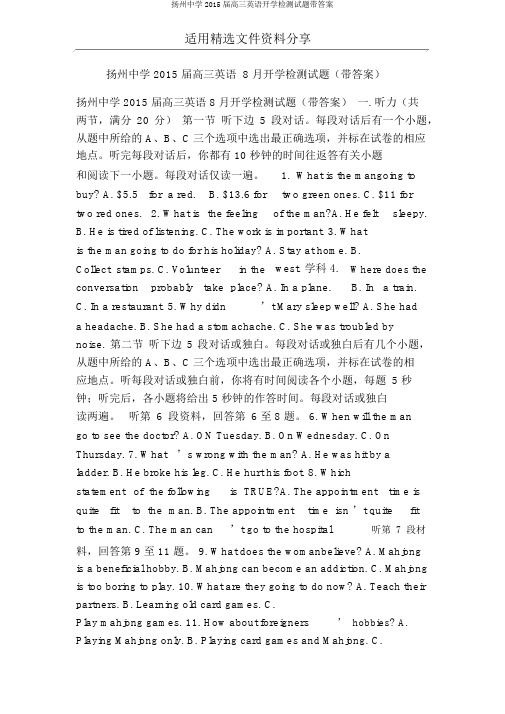
适用精选文件资料分享扬州中学 2015 届高三英语 8 月开学检测试题(带答案)扬州中学 2015 届高三英语 8 月开学检测试题(带答案)一. 听力(共两节,满分20 分)第一节听下边5 段对话。
每段对话后有一个小题,从题中所给的 A、B、C三个选项中选出最正确选项,并标在试卷的相应地点。
听完每段对话后,你都有 10 秒钟的时间往返答有关小题和阅读下一小题。
每段对话仅读一遍。
1. What is the mangoing to buy? A. $5.5for a red. B. $13.6 for two green ones. C. $11 fortwo red ones. 2. What is the feeling of the man?A. He felt sleepy.B. He is tired of listening.C. The work is important. 3. Whatis the man going to do for his holiday? A. Stay at home. B.Collect stamps. C. Volunteer in the west. 学科 4.Where does the conversation probably take place? A. In a plane. B. In a train. C. In a restaurant. 5. Why didn’t Mary sleep well? A. She hada headache. B. She had a stomachache. C. She was troubled by noise. 第二节听下边5 段对话或独白。
每段对话或独白后有几个小题,从题中所给的 A、B、C三个选项中选出最正确选项,并标在试卷的相应地点。
听每段对话或独白前,你将有时间阅读各个小题,每题 5 秒钟;听完后,各小题将给出 5 秒钟的作答时间。
江苏省扬州中学高三英语下学期开学检测
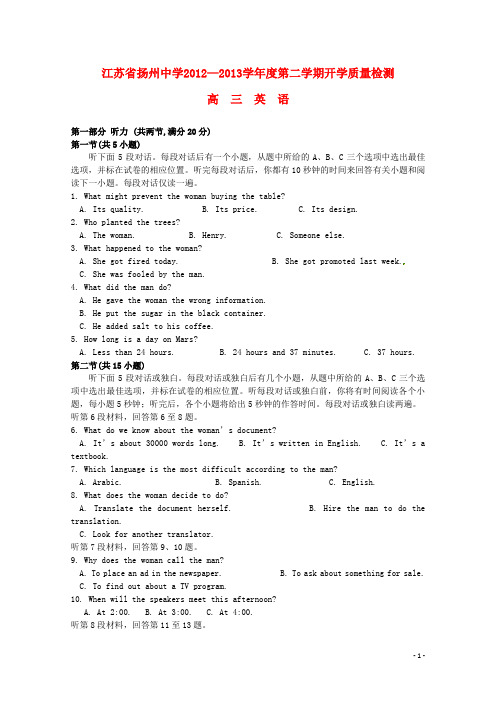
江苏省扬州中学2012—2013学年度第二学期开学质量检测高三英语第一部分听力 (共两节,满分20分)第一节(共5小题)听下面5段对话。
每段对话后有一个小题,从题中所给的A、B、C三个选项中选出最佳选项,并标在试卷的相应位置。
听完每段对话后,你都有10秒钟的时间来回答有关小题和阅读下一小题。
每段对话仅读一遍。
1. What might prevent the woman buying the table?A. Its quality.B. Its price.C. Its design.2. Who planted the trees?A. The woman.B. Henry.C. Someone else.3. What happened to the woman?A. She got fired today.B. She got promoted last week.C. She was fooled by the man.4. What did the man do?A. He gave the woman the wrong information.B. He put the sugar in the black container.C. He added salt to his coffee.5. How long is a day on Mars?A. Less than 24 hours.B. 24 hours and 37 minutes.C. 37 hours. 第二节(共15小题)听下面5段对话或独白。
每段对话或独白后有几个小题,从题中所给的A、B、C三个选项中选出最佳选项,并标在试卷的相应位置。
听每段对话或独白前,你将有时间阅读各个小题,每小题5秒钟;听完后,各个小题将给出5秒钟的作答时间。
每段对话或独白读两遍。
听第6段材料,回答第6至8题。
6. What do we know about the woman’s document?A. It’s about 30000 words long.B. It’s written in English.C. It’s a textbook.7. Which language is the most difficult according to the man?A. Arabic.B. Spanish.C. English.8. What does the woman decide to do?A. Translate the document herself.B. Hire the man to do the translation.C. Look for another translator.听第7段材料,回答第9、10题。
江苏省扬州中学2015届高三8月开学考试 英语 含答案

扬大暑假夏令营英语试卷2014。
8一。
听力(共两节,满分20分)第一节听下面5段对话。
每段对话后有一个小题,从题中所给的A、B、C三个选项中选出最佳选项,并标在试卷的相应位置。
听完每段对话后,你都有10秒钟的时间来回答有关小题和阅读下一小题。
每段对话仅读一遍.1。
What is the man going to buy?A. $5。
5 for a red.B. $13.6 for two green ones。
C. $11 for two red ones。
2. What is the feeling of the man?A. He felt sleepy. B。
He is tired of listening。
C。
The work is important。
3. What is the man going to do for his holiday?A。
Stay at home。
B。
Collect stamps。
C。
Volunteer in the west.4. Where does the conversation probably take place?A。
In a plane。
B。
In a train。
C。
In a restaurant.5。
Why didn't Mary sleep well?A。
She had a headache。
B。
She had a stomachache。
C。
She was troubled by noise。
第二节听下面5段对话或独白。
每段对话或独白后有几个小题,从题中所给的A、B、C三个选项中选出最佳选项,并标在试卷的相应位置。
听每段对话或独白前,你将有时间阅读各个小题,每小题5秒钟;听完后,各小题将给出5秒钟的作答时间.每段对话或独白读两遍。
听第6段材料,回答第6至8题。
6. When will the man go to see the doctor?A。
江苏省扬州中学高三下英语学期开学练习

扬州中学高三下学期英语开学测试第I卷(三部分,共85分)第一部分:听力(共两节,满分20分)第一节(共5小题;每小题1分,满分5分)听下面五段对话。
每段对话后有一个小题,从题后所给的ABC三个选项中选出最佳选项,并标在试卷的相应位置。
听完每段对话后你都有10秒钟的时间来回答有关小题和阅读下一小题。
每段对话仅读一遍。
1. Where is the conversation probably taking place?A. In a restaurant.B. In a bank.C. In an airport.2. Who made the kite?A. The woman.B. The man.C. John.3. What’s the rent if the man wants a single room with a hot bath?A. $50.B. $15.C. $35.4. How much time does it take Jane to the place?A. 15 minutes.B. 30 minutes.C. 45 minutes.5. What can we learn from this conversation?A. The man enjoyed the match very much.B. The man was too tired to watch the game.C. The game was over before the man got home.第二节(共10小题;每小题2分,满分20分)听下面5段对话或独白。
每段对话或独白后有几个小题,从题中所给的A、B、C三个选项中选出最佳选项,并标在试卷的相应位置。
听每段对话或独白前,你将有时间阅读各个小题,每小题5秒钟;听完后,各个小题将给出5秒钟的作答时间。
每段对话或独白读两遍。
听下面一段对话,回答第6至7两个小题。
江苏省扬州中学2015届高三下学期开学检测英语试题(含答案)
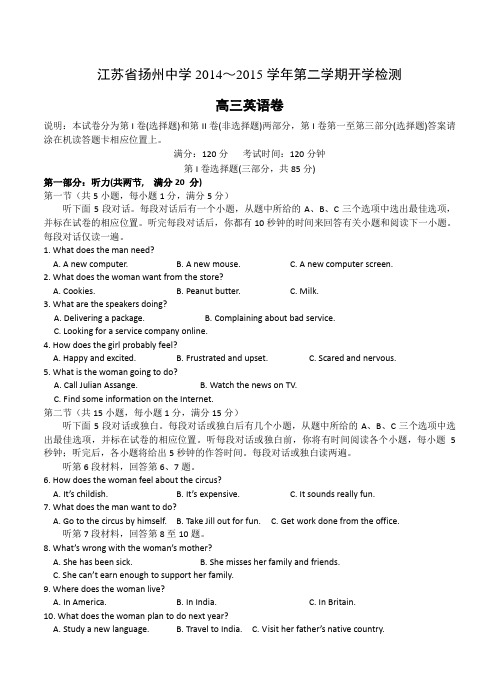
江苏省扬州中学2014~2015学年第二学期开学检测高三英语卷说明:本试卷分为第I卷(选择题)和第II卷(非选择题)两部分,第I卷第一至第三部分(选择题)答案请涂在机读答题卡相应位置上。
满分:120分考试时间:120分钟第I卷选择题(三部分,共85分)第一部分:听力(共两节, 满分20 分)第一节(共5小题,每小题1分,满分5分)听下面5段对话。
每段对话后有一个小题,从题中所给的A、B、C三个选项中选出最佳选项,并标在试卷的相应位置。
听完每段对话后,你都有10秒钟的时间来回答有关小题和阅读下一小题。
每段对话仅读一遍。
1. What does the man need?A. A new computer.B. A new mouse.C. A new computer screen.2. What does the woman want from the store?A. Cookies.B. Peanut butter.C. Milk.3. What are the speakers doing?A. Delivering a package.B. Complaining about bad service.C. Looking for a service company online.4. How does the girl probably feel?A. Happy and excited.B. Frustrated and upset.C. Scared and nervous.5. What is the woman going to do?A. Call Julian Assange.B. Watch the news on TV.C. Find some information on the Internet.第二节(共15小题,每小题1分,满分15分)听下面5段对话或独白。
每段对话或独白后有几个小题,从题中所给的A、B、C三个选项中选出最佳选项,并标在试卷的相应位置。
江苏省扬州中学2015—2016学年第一学期12月份考试高三英语卷

江苏省扬州中学2015—2016学年第一学期12月份考试高三英语试卷2015.12本卷分为第Ⅰ卷(选择题)和第Ⅱ卷(非选择题),满分120分。
考试时间120分钟。
第I 卷(选择题,三部分,共75分)第一部分听力(共两节,每题1分,满分20分)第一节1. What does the woman like doing best?A. Playing tennis.B. Playing the piano.C. Singing.2. At what time does the second performance start?A. 7:00B. 7:10C. 9:103. What is the man doing?A. Giving advice.B. Making a request.C. Offering help.4. What are the two speakers mainly talking about?A. The woman’s lessons.B. The woman’s new teachers.C. The woman’s new classmate.5. Why will the woman call the man’s roommate?A. To complain about the high rent.B. To find out about an apartment.C. To share an apartment with him.第二节听下面一段对话,回答第6—7题。
6. What does the woman provide as her identification?A. Her birth certificate.B. Her driver’s license.C. Her ID card.7. Why can’t the woman travel first class?A. She has too much baggage to be upgraded.B. The travel agency made a mistake.C. It has been fully booked already.听下面一段对话,回答第8—10题。
江苏省扬州中学2015届高三第二学期开学检测英语试题

江苏省扬州中学2014~2015学年第二学期开学检测高三英语卷第一节单项填空(共15小题,每小题1分,满分15分)21. Shanghai has climbed up the cost-of-living ladder to No.21 on ________ world‟s most expensive city list, overtaking New York for the first time, according to ________ global cost-of-living survey.A. the; theB. a; aC. /;theD. the; a22. While it wasn‟t the goal of the trip, I was rewarded with fresh insights, ones that ________ to me during the regular course of business.A. needn‟t have happenedB. could have happenedC. would never have happenedD. must have happened23. He bought extra food ________ more people coming than he‟d invited.A. in anticipation ofB. in defense ofC. in exchange forD. in agreement with24. Most Chinese movies are reported to ________ money, and only around a quarter make into cinemas, ________ profits are squeezed by piracy.A. lose; whoseB. have lost; whichC. lose; theirD. be losing; whose25. As students, we should keep it in mind that every minute ________ full use of ________ our lessons will benefit us a great deal.A. which makes; studyingB. when made; to studyC. that made; to studyD. when is made; studying26. —Didn‟t Mr. Black sell his car?—________. Its poor quality ________ many potential buyers.A. No; turned offB. Yes; turned inC. No; turned awayD. Yes; turn out27. People sat in the waiting hall, ________ seriously and their eyes ________ on the planes standing on the running field.A. looked; fixedB. looked; fixingC. looking; fixedD. looking; fixing28. It is commonly believed that using the mobile phone is contagious(有传染性的) ________ people are twice as ________ to pull out their phones to check their text messages or emails when staying with someone that has just done the same.A. in that; possibleB. because; probablyC. except that; likelyD. in that; likely29. We are eager to raise people‟s awareness about our environment in ________ and water pollution in ________ because more and more people are lacking clean fresh water.A. particular; generalB. common; particularC. average; commonD. general; particular30. —The children of our village ________ boats to school until the repairs of the destroyed bridge have been made .—How dangerous! If only it wouldn‟t happen .A. have takenB. takeC. tookD. are taking31. There are much brighter prospects for a ________ settlement than before.A. expensiveB. persuasiveC. comprehensiveD. massive32. According to the job advertisement, ________ will be given to the candidates with working experience. A. presentation B. preference C. profession D. production 33. If you had the power to ________ things you consider right, would you do so against the wishes of the majority?A. put into effectB. correspond toC. catch up onD. put up with34. He got into the old truck and off _____ to one of the far corners of the farm to fix the fences.A. did they rushB. they did rushC. they rushedD. rushed they35. —Do you think you will be able to finish your writing by five o‟clock today?—________. I‟ll be busy with experiments all day.A. Not a chanceB. Not a littleC. Not to mention itD. No wonder第二节:完形填空(共20 小题,每小题1分,满分20分)“Hey, nurse!”A man‟s voice, loud and gruff, was coming from room 254. Hungry and 36 , I was taking a shortcut through the telemetry unit after another busy day. These weren‟t my patients, so I kept going.“You, blondie.” I stopped and looked 37 . No other nurses were in sight, so I went to the doorway of room 254 and 38 in. A large man with a big, friendly face was sitting up in the bed. He spoke 39 I had a chance to open my mouth. “Do you remember me? You were my nurse on the fourth floor.”I told him I 40 in the critical care unit. He must have me 41 with someone else.“No, wait a minute. Your name is... oh, let me think...”He 42 at the ceiling, a half smile on his face. Then he turned to me, “Jackie, right? You‟ve got a long blonde ponytail, don‟t you?”I was 43 . I studied his face, looking for something that might trigger my 44 .“That‟s all right, Jackie. You came into my room about three weeks ago. My heart stopped 45 on me and you put those paddles(控制手柄) on my chest. I remember you 46 out all these technical sounding words, telling everybody to 47 the way. Then you took those electric paddles and 48 me back to life.”Suddenly it 49 on me: he was a 50 person then—unresponsive, with dilated pupils(放大的瞳孔) and a red and blue face.“Who told you I 51 you that day?” I asked, my 52 pulling me into his room.He laughed and looked back up at the ceiling. “Nobody told me. I was up on that ceiling there watching you. That‟s how I saw your long, blonde ponytail. And when you turned to look at the monitor, I saw your beautiful face. I‟m so 53 I got to see you again.”He looked down at me, his smile gone. I could see he was 54 with his emotions. “I wanted to say thanks. Thanks so much...”Every time I pass room 254 now, a warm feeling 55 inside me.36. A. wiped out B. given out C. worn out D. tried out37. A. down B. around C. up D. inside38. A. glanced B. rushed C. stepped D. checked39. A. since B. while C. as D. before40. A. watched B. cared C. worked D. stayed41. A. confused B. mixed C. mistaken D. replaced42. A. stared up B. glanced up C. glimpsed up D. looked up43. A. annoyed B. surprised C. disappointed D. pleased44. A. mind B. emotions C. heart D. memory45. A. senseless B. still C. dead D. short46. A. bringing B. forcing C. shouting D. speaking47. A. pull B. push C. find D. clear48. A. shocked B. pulled C. dragged D. pressed49. A. broke B. struck C. occurred D. dawned50. A. sick B. fearful C. different D. weak51. A. treated B. helped C. cured D. met52. A. responsibility B. tenderness C. curiosity D. kindness53. A. glad B. lucky C. surprised D. satisfied54. A. shaking B. struggling C. working D. fighting55. A. turns up B. wells up C. opens up D. brings up第三部分:阅读理解(共15小题,每小题2分,满分30分)阅读下列短文,然后从各题所给的四个选项(A、B、C、D)中,选出最佳选项。
江苏省扬州中学高三下学期开学2月考试英语试卷 无答案
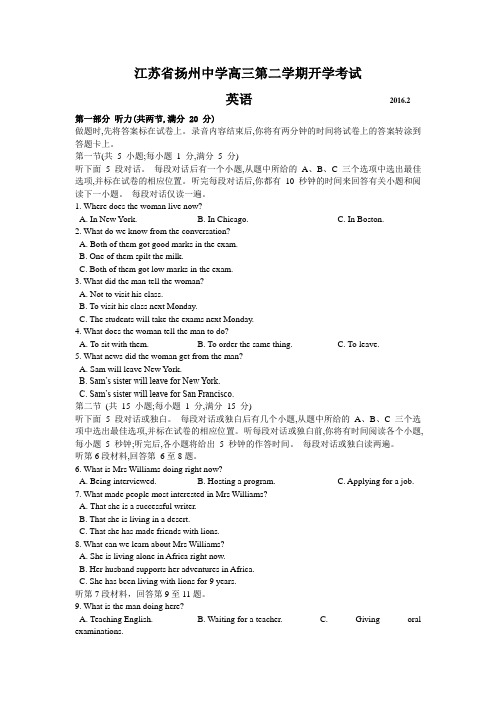
江苏省扬州中学高三第二学期开学考试英语2016.2第一部分听力(共两节,满分 20 分)做题时,先将答案标在试卷上。
录音内容结束后,你将有两分钟的时间将试卷上的答案转涂到答题卡上。
第一节(共 5 小题;每小题1 分,满分5 分)听下面 5 段对话。
每段对话后有一个小题,从题中所给的A、B、C 三个选项中选出最佳选项,并标在试卷的相应位置。
听完每段对话后,你都有10 秒钟的时间来回答有关小题和阅读下一小题。
每段对话仅读一遍。
1. Where does the woman live now?A. In New York.B. In Chicago.C. In Boston.2. What do we know from the conversation?A. Both of them got good marks in the exam.B. One of them spilt the milk.C. Both of them got low marks in the exam.3. What did the man tell the woman?A. Not to visit his class.B. To visit his class next Monday.C. The students will take the exams next Monday.4. What does the woman tell the man to do?A. To sit with them.B. To order the same thing.C. To leave.5. What news did the woman get from the man?A. Sam will leave New York.B. Sam’s sister will leave for New York.C. Sam’s sister will leave for San Francisco.第二节(共15 小题;每小题 1 分,满分15 分)听下面 5 段对话或独白。
2015高考三模 江苏省南通、扬州、淮安、泰州四市2015届高三第三次调研英语试题 Word版含答案
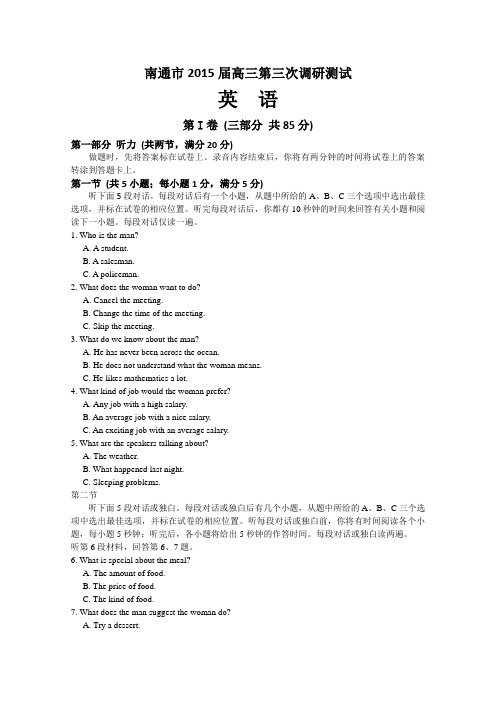
南通市2015届高三第三次调研测试英语第I卷(三部分共85分)第一部分听力(共两节,满分20分)做题时,先将答案标在试卷上。
录音内容结束后,你将有两分钟的时间将试卷上的答案转涂到答题卡上。
第一节(共5小题;每小题1分,满分5分)听下面5段对话。
每段对话后有一个小题,从题中所给的A、B、C三个选项中选出最佳选项,并标在试卷的相应位置。
听完每段对话后,你都有10秒钟的时间来回答有关小题和阅读下一小题。
每段对话仅读一遍。
1. Who is the man?A. A student.B. A salesman.C. A policeman.2. What does the woman want to do?A. Cancel the meeting.B. Change the time of the meeting.C. Skip the meeting.3. What do we know about the man?A. He has never been across the ocean.B. He does not understand what the woman means.C. He likes mathematics a lot.4. What kind of job would the woman prefer?A. Any job with a high salary.B. An average job with a nice salary.C. An exciting job with an average salary.5. What are the speakers talking about?A. The weather.B. What happened last night.C. Sleeping problems.第二节听下面5段对话或独白。
每段对话或独白后有几个小题,从题中所给的A、B、C三个选项中选出最佳选项,并标在试卷的相应位置。
- 1、下载文档前请自行甄别文档内容的完整性,平台不提供额外的编辑、内容补充、找答案等附加服务。
- 2、"仅部分预览"的文档,不可在线预览部分如存在完整性等问题,可反馈申请退款(可完整预览的文档不适用该条件!)。
- 3、如文档侵犯您的权益,请联系客服反馈,我们会尽快为您处理(人工客服工作时间:9:00-18:30)。
江苏省扬州中学2014~2015学年第二学期开学检测高三英语卷说明:本试卷分为第I卷(选择题)和第II卷(非选择题)两部分,第I卷第一至第三部分(选择题)答案请涂在机读答题卡相应位置上。
满分:120分考试时间:120分钟第I卷选择题(三部分,共85分)第一部分:听力(共两节, 满分20 分)第一节(共5小题,每小题1分,满分5分)听下面5段对话。
每段对话后有一个小题,从题中所给的A、B、C三个选项中选出最佳选项,并标在试卷的相应位置。
听完每段对话后,你都有10秒钟的时间来回答有关小题和阅读下一小题。
每段对话仅读一遍。
1. What does the man need?A. A new computer.B. A new mouse.C. A new computer screen.2. What does the woman want from the store?A. Cookies.B. Peanut butter.C. Milk.3. What are the speakers doing?A. Delivering a package.B. Complaining about bad service.C. Looking for a service company online.4. How does the girl probably feel?A. Happy and excited.B. Frustrated and upset.C. Scared and nervous.5. What is the woman going to do?A. Call Julian Assange.B. Watch the news on TV.C. Find some information on the Internet.第二节(共15小题,每小题1分,满分15分)听下面5段对话或独白。
每段对话或独白后有几个小题,从题中所给的A、B、C三个选项中选出最佳选项,并标在试卷的相应位置。
听每段对话或独白前,你将有时间阅读各个小题,每小题5秒钟;听完后,各小题将给出5秒钟的作答时间。
每段对话或独白读两遍。
听第6段材料,回答第6、7题。
6. How does the woman feel about the circus?A. It’s childish.B. It’s expensive.C. It sounds really fun.7. What does the man want to do?A. Go to the circus by himself.B. Take Jill out for fun.C. Get work done from the office.听第7段材料,回答第8至10题。
8. What’s wrong with the woman’s mother?A. She has been sick.B. She misses her family and friends.C. She can’t earn enough to support her family.9. Where does the woman live?A. In America.B. In India.C. In Britain.10. What does the woman plan to do next year?A. Study a new language.B. Travel to India.C. Visit her father’s native country.听第8段材料, 回答第11至13题。
11. When did the man work as a bike mechanic?A. Two years ago.B. Five years ago.C. Ten years ago.12. Which park did the speakers decide to go to in the end?A. Regent’s Park.B. London Fields.C. Victoria Park.13. What do we know about the woman’s bike?A. It hasn’t been used for long.B. It is in good condition.C. The woman just had it repaired.听第9段材料,回答第14至16题。
14. Who is Buster?A. A child.B. A dog.C. A cat.15. What does Buster often do?A. Walk with Lily to school.B. Wait for the man in the park.C. Play with the woman.16. What has the woman been doing?A. Asking the man to give up.B. Comforting the man.C. Criticizing the man.听第10段材料,回答第17至20题。
17. How many days will the office be closed?A. One.B. Two.C. Three.18. What is going on in the building?A. Construction work.B. Celebration activities.C. Moving houses.19. What will employees talk about at the meeting on Monday?A. Their future plans.B. Achievement in the past year.C. Work they did at home.20. Who is Danielle Wilkins?A. The speaker.B. The office manager.C. The building manager.第二部分:知识运用(共两节, 满分35分)第一节单项填空(共15小题,每小题1分,满分15分)从A、B、C、D四个选项中选出可以填入空白处的最佳选项,并在答题卡上将该项涂黑。
21. Shanghai has climbed up the cost-of-living ladder to No.21 on ________ world’s most expensive city list, overtaking New York for the first time, according to ________ global cost-of-living survey.A. the; theB. a; aC. /;theD. the; a22. While it wasn’t the goal of the trip, I was rewarded with fresh insights, ones that ________ to me during the regular course of business.A. needn’t have happenedB. could have happenedC. would never have happenedD. must have happened23. He bought extra food ________ more people coming than he’d invited.A. in anticipation ofB. in defense ofC. in exchange forD. in agreement with24. Most Chinese movies are reported to ________ money, and only around a quarter make into cinemas, ________ profits are squeezed by piracy.A. lose; whoseB. have lost; whichC. lose; theirD. be losing; whose25. As students, we should keep it in mind that every minute ________ full use of ________ our lessons will benefit us a great deal.A. which makes; studyingB. when made; to studyC. that made; to studyD. when is made; studying26. —Didn’t Mr. Black se ll his car?—________. Its poor quality ________ many potential buyers.A. No; turned offB. Yes; turned inC. No; turned awayD. Yes; turn out27. People sat in the waiting hall, ________ seriously and their eyes ________ on the planes standing on the running field.A. looked; fixedB. looked; fixingC. looking; fixedD. looking; fixing28. It is commonly believed that using the mobile phone is contagious(有传染性的) ________ people are twice as ________ to pull out their phones to check their text messages or emails when staying with someone that has just done the same.A. in that; possibleB. because; probablyC. except that; likelyD. in that; likely29. We are eager to raise people’s awareness about our environment in ________ and water pollution in ________ because more and more people are lacking clean fresh water.A. particular; generalB. common; particularC. average; commonD. general; particular30. —The children of our village ________ boats to school until the repairs of the destroyed bridge have been made .—How dangerous! If only it wouldn’t happen .A. have takenB. takeC. tookD. are taking31. There are much brighter prospects for a ________ settlement than before.A. expensiveB. persuasiveC. comprehensiveD. massive32. According to the job advertisement, ________ will be given to the candidates with working experience.A. presentationB. preferenceC. professionD. production33. If you had the power to ________ things you consider right, would you do so against the wishes of the majority?A. put into effectB. correspond toC. catch up onD. put up with34. He got into the old truck and off _____ to one of the far corners of the farm to fix the fences.A. did they rushB. they did rushC. they rushedD. rushed they35. —Do you think you will be able to finish your writing by five o’clock today?—________. I’ll be busy with experiments all day.A. Not a chanceB. Not a littleC. Not to mention itD. No wonder第二节:完形填空(共20 小题,每小题1分,满分20分)阅读下面短文, 掌握其大意, 然后从36~55 各题所给的四个选项(A、B、C和D) 中, 选出最佳选项, 并在答题纸上将该选项标号涂黑。
